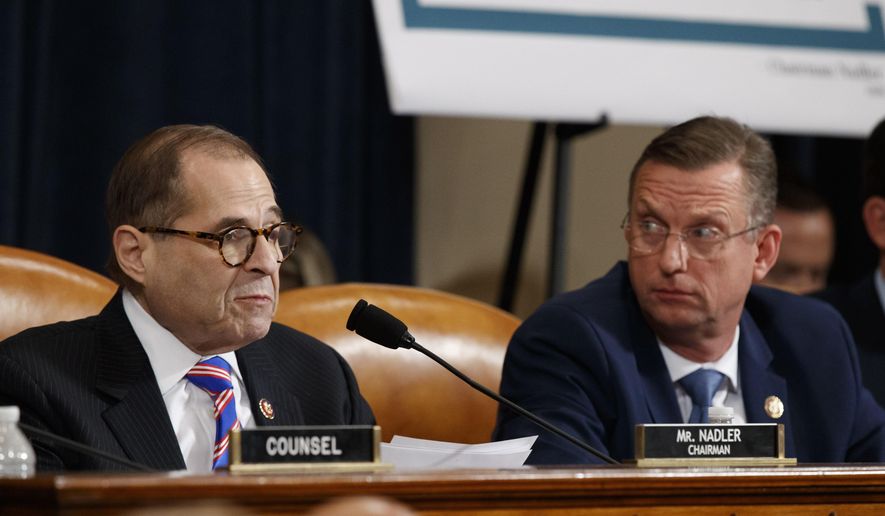House Judiciary Committee Chairman Jerrold L. Nadler on Monday put a fine point on Democrats’ impeachment case against President Trump, arguing that the president put himself before the country.
“We surely agree that no public official, including and especially the president of the United States, should use his public office for private gain,” he said at the opening of an evidentiary hearing before his committee.
Based on the evidence presented, the committee will proceed to write articles of impeachment against Mr. Trump.
Mr. Nadler, New York Democrat, called the process a “solemn and serious undertaking” that Congress must engage in to address serious threats to America’s institutions, such as “free and fair elections.”
He said both sides should be able to agree on the fact of the case if Republicans would remove “their blinders.”
“We agree that no president should put himself before the country,” Mr. Nadler said. “The Constitution and his oath of office, his promise to American citizens, require the country’s president to put the country first.”
SEE ALSO: Trump impeachment hearing becomes a shouting match
Mr. Trump has denied wrongdoing and denounced the House impeachment drive as a partisan “sham.”
The articles of impeachment are expected to include charges of abuse of power, bribery and obstructing the congressional probe, all of which stem from Mr. Trump asking Ukraine to investigate political rival Joseph R. Biden and his son Hunter.
Republicans argue that Mr. Trump’s action, though unconventional, did not cross the line into criminality. They’ve also vouched for the legitimacy of investigating Hunter Biden, who landed a $50,000-a-month job on a Ukraine natural gas company, while his father was the point man for Obama White House policy in that graft-riddled country.
The impeachment case stems from a July 25 phone call in which Mr. Trump pressed Ukraine President Volodymyr Zelensky for a “favor” in investigating the Bidens and Ukraine meddling in the 2016 election.
A whistleblower, who is believed to be a CIA official assigned to the White House, accused the president of abusing his power for personal gain on the call, including withholding $391 million of U.S. military aid from Ukraine as leverage.
A rough transcript of the call the White House released in late September did not show the president present a quid pro quo deal for the investigations, but Democrats have argued the threat was understood and part of an ongoing pressure campaign of “shadow” foreign policy conducted by Mr. Trump’s private lawyer, former New York Mayor Rudolph W. Giuliani.
The quid pro quo, a Latin term meaning a transaction of “this for that,” is the crux of the Democrats’ case that Mr. Trump engaged in a bribery or extortion scheme that warrants impeachment.
The Judiciary Committee is reviewing evidence gathered by an inquiry led by the Permanent Select Committee on Intelligence. Much of the evidence was presented in two weeks of public hearings last month.
The most powerful testimony yet in the inquiry came from Gordon Sondland, the ambassador to the European Union, who said he offered a quid pro quo of a prized White House visit for the newly-elected Mr. Zelensky for the investigations. But Mr. Sondland said he “presumed” that was what Mr. Trump wanted.
In his only conversation with the president about it, Mr. Trump told him that there was “no quid pro quo,” Mr. Sondland testified.
None of the witnesses in the impeachment inquiry linked the holdup of military assistance to the investigations or provided a reason for the holdup. The aid was delayed for about two months, before the money started to flow to Ukraine on Sept. 11, two days after the Inspector General of the Intelligence Community informed Congress of the whistleblower complaint.
Mr. Trump has acknowledged that he wanted an investigation into alleged corruption involving Mr. Biden and his son Hunter, who landed a high-paying job on the board of Ukraine natural gas company Burisma Holdings in 2014. At the time, his father was the point man for Obama White House policy in the country, which is notorious for corruption, especially in the energy industry.
The elder Mr. Biden recently boasted of forcing Ukraine leaders to fire the country’s chief prosecutor in spring 2016 by threatening to block a $1 billion U.S. loan guarantee. The prosecutor was widely viewed as not doing enough to combat corruption. But the prosecutor, Viktor Shokin, also had looked into corruption allegations against Burisma and Mykola Zlochevsky, the Ukraine oligarch running the company.
Mr. Trump also wanted Ukraine to look into a missing Democratic National Committee server that was hacked by Russia during the 2016 presidential campaigns. An American cybersecurity company called CrowdStrike examined the server to probe the hack but the server disappeared before it got to the FBI.
Mr. Trump subscribes to an unsubstantiated theory that the server ended up in Ukraine.
• S.A. Miller can be reached at smiller@washingtontimes.com.




Please read our comment policy before commenting.